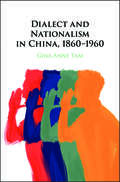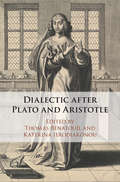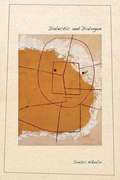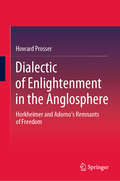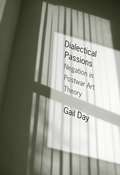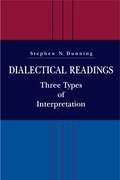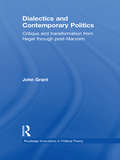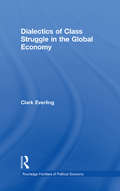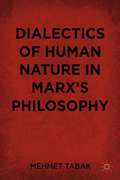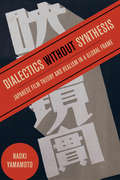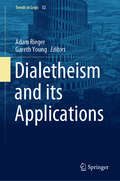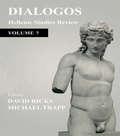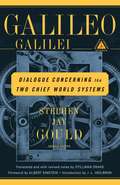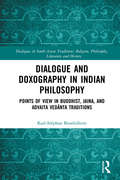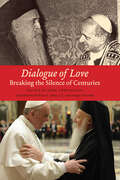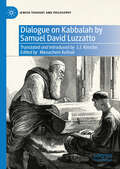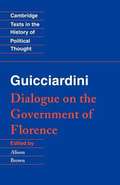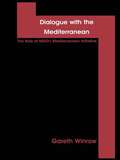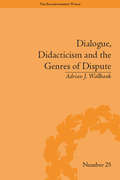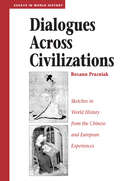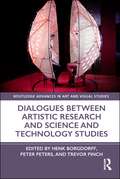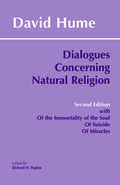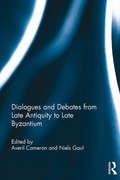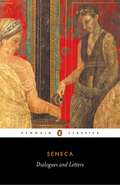- Table View
- List View
Dialect and Nationalism in China, 1860–1960
by Gina Anne TamTaking aim at the conventional narrative that standard, national languages transform 'peasants' into citizens, Gina Anne Tam centers the history of the Chinese nation and national identity on fangyan - languages like Shanghainese, Cantonese, and dozens of others that are categorically different from the Chinese national language, Mandarin. She traces how, on the one hand, linguists, policy-makers, bureaucrats and workaday educators framed fangyan as non-standard 'variants' of the Chinese language, subsidiary in symbolic importance to standard Mandarin. She simultaneously highlights, on the other hand, the folksong collectors, playwrights, hip-hop artists and popular protestors who argued that fangyan were more authentic and representative of China's national culture and its history. From the late Qing through the height of the Maoist period, these intertwined visions of the Chinese nation - one spoken in one voice, one spoken in many - interacted and shaped one another, and in the process, shaped the basis for national identity itself.
Dialectic after Plato and Aristotle
by Katerina Ierodiakonou Thomas BénatouïlAncient dialectic started as an art of refutation and evolved into a science akin to our logic, grammar and linguistics. Scholars of ancient philosophy have traditionally focused on Plato's and Aristotle's dialectic without paying much attention to the diverse conceptions and uses of dialectic presented by philosophers after the classical period. To bridge this gap, this volume aims at a comprehensive understanding of the competing Hellenistic and Imperial definitions of dialectic and their connections with those of the classical period. It starts from the Megaric school of the fourth century BCE and the early Peripatetics, via Epicurus, the Stoics, the Academic sceptics and Cicero, to Sextus Empiricus and Galen in the second century CE. The philosophical foundations and various uses of dialectic are closely analysed and systematically examined together with the numerous objections that were raised against them.
Dialectic and Dialogue
by Dmitri NikulinThis book considers the emergence of dialectic out of the spirit of dialogue and traces the relation between the two. It moves from Plato, for whom dialectic is necessary to destroy incorrect theses and attain thinkable being, to Cusanus, to modern philosophers-Descartes, Kant, Hegel, Schleiermacher and Gadamer, for whom dialectic becomes the driving force behind the constitution of a rational philosophical system. Conceived as a logical enterprise, dialectic strives to liberate itself from dialogue, which it views as merely accidental and even disruptive of thought, in order to become a systematic or scientific method. The Cartesian autonomous and universal yet utterly monological and lonely subject requires dialectic alone to reason correctly, yet dialogue, despite its unfinalizable and interruptive nature, is what constitutes the human condition.
Dialectic of Enlightenment in the Anglosphere: Horkheimer and Adorno's Remnants of Freedom
by Howard ProsserThis book explores the reception of Max Horkheimer and Theodor W. Adorno’s Dialectic of Enlightenment. It examines a variety of perspectives on the text, supplied by e.g. American critical theorists, British New Leftists, Transatlantic Cultural Studies scholars, Postmodernists, and those working in the current after-theory moment from 1970 to 2010. It considers the works of the Frankfurt School, especially Horkheimer and Adorno, alongside the secondary literature on the subject. The main focus is on how various intellectual circles and trends have responded to the Dialectic, making scholarly discussions the primary sources. While the work is a history of the Dialectic of Enlightenment’s Anglophone reception, it also reflects the post-1968 left’s retreat to academia, which echoes the Frankfurt School’s own stance of political resignation.
Dialectical Passions: Negation in Postwar Art Theory
by Gail DayRepresenting a new generation of theorists who reaffirm the radical dimensions of art, Gail Day launches a bold critique of late-twentieth-century art theory and its often reductive analysis of cultural objects. Exploring core debates in discourses on art, from the New Left to theories of "critical postmodernism" and beyond, Day counters the belief that recent tendencies in art fail to be adequately critical and challenges the political inertia that results from these conclusions. Day organizes her defense around critics who have engaged substantively with emancipatory thought and social process: T. J. Clark, Manfredo Tafuri, Fredric Jameson, Benjamin H. D. Buchloh, and Hal Foster, among others. She maps the tension between radical dialectics and left nihilism and assesses the interpretation and internalization of negation in art theory. Chapters confront the claim that exchange and equivalence have subsumed the use value of cultural objects& mdash;and with it critical distance; the meaning of symbol and allegory in 1980s art and its limited reading of the writings of Walter Benjamin and Paul de Man; and common conceptions of mediation, totality, and the politics of anticipation. A necessary unsettling of received wisdoms, Dialectical Passions sets a new course for emancipatory reflection in aesthetics, art, and architecture.
Dialectical Passions: Negation in Postwar Art Theory (Columbia Themes in Philosophy, Social Criticism, and the Arts)
by Gail DayRepresenting a new generation of theorists reaffirming the radical dimensions of art, Gail Day launches a bold critique of late twentieth-century art theory and its often reductive analysis of cultural objects. Exploring core debates in discourses on art, from the New Left to theories of "critical postmodernism" and beyond, Day counters the belief that recent tendencies in art fail to be adequately critical. She also challenges the political inertia that results from these conclusions.Day organizes her defense around critics who have engaged substantively with emancipatory thought and social process: T. J. Clark, Manfredo Tafuri, Fredric Jameson, Benjamin H. D. Buchloh, and Hal Foster, among others. She maps the tension between radical dialectics and left nihilism and assesses the interpretation and internalization of negation in art theory. Chapters confront the claim that exchange and equivalence have subsumed the use value of cultural objects-and with it critical distance- and interrogate the proposition of completed nihilism and the metropolis put forward in the politics of Italian operaismo. Day covers the debates on symbol and allegory waged within the context of 1980s art and their relation to the writings of Walter Benjamin and Paul de Man. She also examines common conceptions of mediation, totality, negation, and the politics of anticipation. A necessary unsettling of received wisdoms, Dialectical Passions recasts emancipatory reflection in aesthetics, art, and architecture.
Dialectical Readings: Three Types of Interpretations
by Stephen N. DunningInterpretation pervades human thinking. Whether perception or experience, spoken word or written theory, whatever enters our consciousness must be interpreted in order to be understood. Every area of inquiry—art and literature, philosophy and religion, history and the social sciences, even many aspects of the natural sciences—involves countless opportunities to interpret the object of inquiry according to very different paradigms. These paradigms may derive from the language we speak, the nature of our education, or personal preferences. The abundance and diversity of paradigms make interpretation both fascinating in its complexity and often frustrating for the conflicts it generates. In Dialectical Readings, Dunning distinguishes three types of interpretation, each defined in terms of a distinctive dialectical way of thinking: theoretical interpretation, which assumes binary oppositions; transactional interpretation, which seeks reciprocal relations; and transformational interpretation, which discerns paradoxical meanings. Dunning offers new and insightful readings of familiar texts by B. F. Skinner, Claude Lévi-Strauss, Lee Benson, Roland Barthes, Friedrich Nietzsche, and Michel Foucault and sheds new light on works by Thomas Kuhn, Joseph Campbell, Reinhold Niebuhr, Søren Kierkegaard, Paul Tillich, and Paul Ricoeur. Dialectical Readings enables readers to recognize diverse dialectical approaches to understanding—their own as well as those of others—in a way that provides new and helpful insights into a wide variety of subjects in which conflicting interpretations abound.
Dialectics and Contemporary Politics: Critique and Transformation from Hegel through Post-Marxism (Routledge Innovations in Political Theory)
by John GrantDialectics and Contemporary Politics recasts dialectical thought for a post-Marxist age in which labour movement politics is just one political option among many. The book is organized thematically around concepts such as immanent critique, ideology, experience, and resistance, and according to figures who are vital to the present trajectory of dialectics, including Hegel, Adorno, Foucault, Jameson and Žizek. New analysis of these concepts and theorists is used to show how they transform our understanding of social life as well as offer a way of understanding social transformation. Interspersed throughout this theoretical work are dialectical examinations of political phenomena from tolerance, democracy, and the rise of Barack Obama, to state-economy relations as well as those of power and resistance. A radical and often revolutionary theory of society is pursued that is no longer confined to the terms of Marxism or any other school of thought. In this regard a novel advance is made by presenting the history of dialectical criticism as an ‘anti-tradition,’ which is defined as a practice that is characterized by a history of discontinuity, discord, and incompatible applications. A theory of dialectics emerges that is flexible, coherent, and which can account for much more than capitalism and class politics. This work will be of great interest to all scholars of Marxism, critical theory, social and political theory and political philosophy
Dialectics of Class Struggle in the Global Economy (Routledge Frontiers Of Political Economy Ser. #Vol. 123)
by Clark EverlingMuch ink has been spilled in attempts to prove that humans are only animals and are, like other species, only aggressive. Marx distinguishes both class and cooperative relations as inorganic: humans create their subjectivity through their mutual social production. They build upon their previous forms of social production and, with capitalism, become not only an opposition of classes, but have the capacity for urban individualism and cooperation. Dialectics of Class Struggle examines the historical development of classes from ancient times to present. It analyses the development of ancient slavery into feudalism and the latter into capitalism. It focuses on the laws and limits of capitalist development, the contradictions inherent in the capitalist state, revolutions in the twentieth century and the possibilities for human freedom that they revealed. It concludes with an examination of class struggles in the global economy and shows the human deprivations as well as the human possibilities.
Dialectics of Human Nature in Marx�s Philosophy
by Mehmet TabakA scholarly exploration of Marx's thought without any favorable or critical ideological agendas, this book opposes the compartmentalization of Marx's thought into various competing doctrines, such as historical materialism, dialectical materialism, and different forms of economic determinism. It highlights Marx's humanism; however, instead of pitting Marx's humanism against materialism, dialectical and historical, this book demonstrates their unity in a novel way. The method employed is exegetical, with an emphasis on Marx's own dialectic method. This approach differentiates the present work from the currently popular interpretations, which (mis)interpret Marx through the prism of analytical philosophy.
Dialectics without Synthesis: Japanese Film Theory and Realism in a Global Frame
by Naoki YamamotoDialectics without Synthesis explores Japan’s active but previously unrecognized participation in the global circulation of film theory during the first half of the twentieth century. Examining a variety of Japanese theorists working in the fields of film, literature, avant-garde art, Marxism, and philosophy, Naoki Yamamoto offers a new approach to cinematic realism as culturally conditioned articulations of the shifting relationship of film to the experience of modernity. In this study, long-held oppositions between realism and modernism, universalism and particularism, and most notably, the West and the non-West are challenged through a radical reconfiguration of the geopolitics of knowledge production and consumption.
Dialetheism and its Applications (Trends in Logic #52)
by Adam Rieger Gareth YoungThe purpose of this book is to present unpublished papers at the cutting edge of research on dialetheism and to reflect recent work on the applications of the theory. It includes contributions from some of the most respected scholars in the field, as well as from young, up-and-coming philosophers working on dialetheism.Moving from the fringes of philosophy to become a main player in debates concerning truth and the logical paradoxes, dialetheism has thrived since the publication of Graham Priest’s In Contradiction, and several of the papers find their roots in a conference on dialetheism held in Glasgow to mark the 25th anniversary of Priest’s book. The content presented here demonstrates the considerable body of work produced in this field in recent years.With a broad focus, this book also addresses the applications of dialetheism outside the more familiar area of the logical paradoxes, and includes pieces discussing the application of dialetheism in metaphysics, philosophy of language, and philosophy of mind.
Dialogos: Hellenic Studies Review
by Michael Trapp David RicksDialogos" encompasses Greek language and literature, Greek history and archaeology, Greek culture and thought, present and past: a territory of distinctive richness and unsurpassed influence. It seeks to foster critical awareness and informed debate about the ideas, events and achievements that make up this territory, by redefining their qualities, by exploring their interconnections and by reinterpreting their significance within Western culture and beyond.
Dialogue Concerning the Two Chief World Systems: Ptolemaic and Copernican
by Stephen Jay Gould Stillman Drake GalileoGalileo's Dialogue Concerning the Two Chief World Systems, published in Florence in 1632, was the most proximate cause of his being brought to trial before the Inquisition. Using the dialogue form, a genre common in classical philosophical works, Galileo masterfully demonstrates the truth of the Copernican system over the Ptolemaic one, proving, for the first time, that the earth revolves around the sun. Its influence is incalculable. The Dialogue is not only one of the most important scientific treatises ever written, but a work of supreme clarity and accessibility, remaining as readable now as when it was first published. This edition uses the definitive text established by the University of California Press, in Stillman Drake's translation, and includes a Foreword by Albert Einstein and a new Introduction by J. L. Heilbron.
Dialogue and Doxography in Indian Philosophy: Points of View in Buddhist, Jaina, and Advaita Vedānta Traditions (Dialogues in South Asian Traditions: Religion, Philosophy, Literature and History)
by Karl-Stéphan BouthilletteThis is the first book fully dedicated to Indian philosophical doxography. It examines the function such dialectical texts were intended to serve in the intellectual and religious life of their public. It looks at Indian doxography both as a witness of inter- and intra-sectarian dialogues and as a religious phenomenon. It argues that doxographies represent dialectical exercises, indicative of a peculiar religious attitude to plurality, and locate these ‘exercises’ within a known form of ‘yoga’ dedicated to the cultivation of ‘knowledge’ or ‘gnosis’ (jñāna). Concretely, the book presents a critical examination of three Sanskrit doxographies: the Madhyamakahṛdayakārikā of the Buddhist Bhāviveka, the Ṣaḍdarśanasamuccaya of the Jain Haribhadra, and the Sarvasiddhāntasaṅgraha attributed to the Advaitin Śaṅkara, focusing on each of their respective presentation of the Mīmāṃsā view. It is the first time that the genre of doxography is considered beyond its literary format to ponder its performative dimension, as a spiritual exercise. Theoretically broad, the book reaches out to academics in religious studies, Indian philosophy, Indology, and classical studies.
Dialogue of Love: Breaking the Silence of Centuries (Orthodox Christianity and Contemporary Thought)
by John ChryssavgisIn 1964, a little-noticed albeit pioneering encounter in the Holy Land between the heads of the Roman Catholic Church and the Orthodox Church spawned numerous contacts and diverse openings between the two “sister churches,” which had not communicated with each other for centuries.Fifty years later, Pope Francis and Ecumenical Patriarch Bartholomew meet in Jerusalem to commemorate that historical event and celebrate the close relations that have developed through mutual exchanges of formal visits and an official theological dialogue that began in 1980. This book contains three unique chapters: The first is a sketch of the behind-the-scenes challenges and negotiations that accompanied the meeting in 1964, detailing the immediate consequences of the event and setting the tone for the volume. The second is an inspirational account, interwoven with a scholarly evaluation of the work of the North American Standing Council on Orthodox/Catholic relations over the past decades. The third chapter presents a recently discovered reflection on the meeting that took place fifty years ago by one of the most important Orthodox theologians of the twentieth century, expressing cautious optimism about the future of Christian unity.
Dialogue on Kabbalah by Samuel David Luzzatto (Jewish Thought and Philosophy)
by Menachem KellnerThis is the first complete translation of Vikuaḥ 'al Ḥokhmat ha-Kabbalah, a literary-philosophical dialogue composed by the great Italian Jewish scholar Samuel David Luzzatto (1800-1865), also known as Shadal. Originally published in Hebrew in 1852, the Dialogue depicts a multi-faceted and acrimonious disputation between two scholars, who debate the authority and authenticity of Jewish mystical traditions. This work subjects Kabbalah, along with its textual centerpiece the Zohar, to both a rigorous critique and an impassioned defense, thereby inviting the reader to critically examine this centuries-old debate. Shadal’s Dialogue is a classic text of the Jewish enlightenment (Haskalah), in which trends of modern scholarship and historical criticism are brought into confrontation with rabbinic tradition and Kabbalistic mysteries. This translation has been augmented by over a thousand footnotes, extensive glossaries, and a lengthy introduction outlining the place of Shadal’s Dialogue within the history of Kabbalah criticism and the rise of modern Jewish scholarship.
Dialogue on the Government of Florence (Cambridge Texts in the History of Political Thought)
by GuicciardiniThis is the first English translation of Guicciardini's Dialogue on the Government of Florence, written in the 1520s. Like Machiavelli, his more famous contemporary and friend, Guicciardini rejects classical republican arguments in the name of the new political realism and acknowledges the important role of patronage and graft in contemporary politics and the illegitimacy of nearly all forms of political power, arguing for the priority of state interest over private morality and religion.
Dialogue with the Mediterranean: The Role of NATO's Mediterranean Initiative (Contemporary Issues in European Politics #Vol. 7)
by Gareth Mark WinrowThe first examination of the importance of NATO's Mediterranean Initiative for the security and stability of the Euro-Mediterranean area, this book discusses the challenges, risks, and possible threats to NATO member states which may stem from the southern and eastern Mediterranean.
Dialogue, Didacticism and the Genres of Dispute: Literary Dialogues in the Age of Revolution (The Enlightenment World)
by Adrian J WallbankDialogue was a pivotal genre for the spread of Enlightenment ideas. Focusing on non-canonical British writers Wallbank examines the evolution of dialogue as a genre during the Romantic period.
Dialogues Across Civilizations: Sketches In World History From The Chinese And European Experiences
by Roxann PrazniakDialogues Across Civilizations sets the histories of China and Europe alongside one another. Each chapter stands as an essay that imaginatively places historical individuals and events in proximity to one another and explores a specific topic,gender relations, rural politics, artistic renderings of nature, to name a few,through the stories of persons who reflected on similar questions but in different social and cultural settings. Through this juxtaposition, Chinese and European civilizations illuminate each other's achievements, problems, and limitations in a range of areas from urban history to religious faith.Privileging neither Europe nor China, this work offers an innovative move away from relativism and multiculturalism towards an analysis that focuses on relationships between social choices and consequences. As a result, both common and divergent perspectives on the human condition emerge for discussion. Drawing upon a rich literature of cross-societal studies, Dialogues Across Civilizations generates reflection on themes central to the study of world history as well as European and Asian history.
Dialogues Between Artistic Research and Science and Technology Studies (Routledge Advances in Art and Visual Studies)
by Trevor Pinch Peter Peters Henk BorgdorffThis edited volume maps dialogues between science and technology studies research on the arts and the emerging field of artistic research. The main themes in the book are an advanced understanding of discursivity and reasoning in arts-based research, the methodological relevance of material practices and things, and innovative ways of connecting, staging, and publishing research in art and academia. This book touches on topics including studies of artistic practices; reflexive practitioners at the boundaries between the arts, science, and technology; non-propositional forms of reasoning; unconventional (arts-based) research methods and enhanced modes of presentation and publication.
Dialogues Concerning Natural Religion
by David Hume Richard H. PopkinHume's brilliant and dispassionate essay Of Miracles has been added in this expanded edition of his Dialogues Concerning Natural Religion, which also includes Of the Immortality of the Soul,Of Suicide, and Richard Popkin's illuminating Introduction.
Dialogues and Debates from Late Antiquity to Late Byzantium
by Averil Cameron Niels GaulDialogues and Debates from Late Antiquity to Late Byzantium offers the first overall discussion of the literary and philosophical dialogue tradition in Greek from imperial Rome to the end of the Byzantine empire and beyond. Sixteen case studies combine theoretical approaches with in-depth analysis and include comparisons with the neighbouring Syriac, Georgian, Armenian and Latin traditions. Following an introduction and a discussion of Plutarch as a writer of dialogues, other chapters consider the Erostrophus, a philosophical dialogue in Syriac, John Chrysostom’s On Priesthood, issues of literariness and complexity in the Greek Adversus Iudaeos dialogues, the Trophies of Damascus, Maximus Confessor’s Liber Asceticus and the middle Byzantine apocryphal revelation dialogues. The volume demonstrates a new frequency in middle and late Byzantium of rhetorical, theological and literary dialogues, concomitant with the increasing rhetoricisation of Byzantine literature, and argues for a move towards new and exciting experiments. Individual chapters examine the Platonising and anti-Latin dialogues written in the context of Anselm of Havelberg’s visits to Constantinople, the theological dialogue by Soterichos Panteugenos, the dialogues of Niketas ‘of Maroneia’ and the literary dialogues by Theodore Prodromos, all from the twelfth century. The final chapters explore dialogues from the empire’s Georgian periphery and discuss late Byzantine philosophical, satirical and verse dialogues by Nikephoros Gregoras, Manuel II Palaiologos and George Scholarios, with special attention to issues of form, dramatisation and performance.
Dialogues and Letters
by SenecaA major writer and a leading figure in the public life of Rome, Seneca (c. 4BC-AD 65) ranks among the most eloquent and influential masters of Latin prose. This selection explores his thoughts on philosophy and the trials of life. In the Consolation to Helvia he strives to offer solace to his mother, following his exile in AD 41, while On the Shortness of Life and On Tranquillity of Mind are lucid and compelling explorations of Stoic thought. Witty and self-critical, the Letters - written to his young friend Lucilius - explore Seneca's struggle to acquire philosophical wisdom. A fascinating insight into one of the greatest minds of Ancient Rome, these works inspired writers and thinkers including Montaigne, Rousseau, and Bacon, and continue to intrigue and enlighten.
